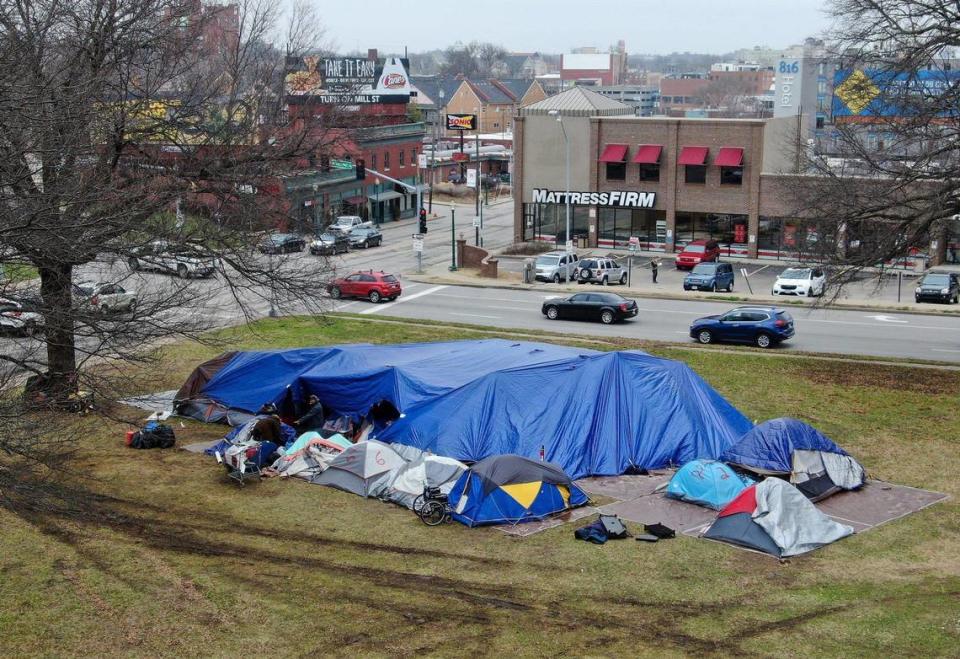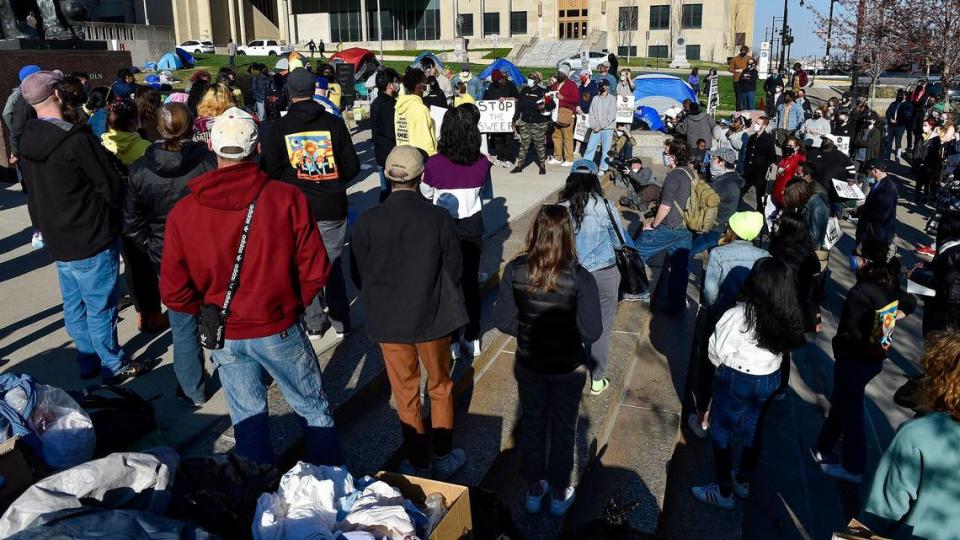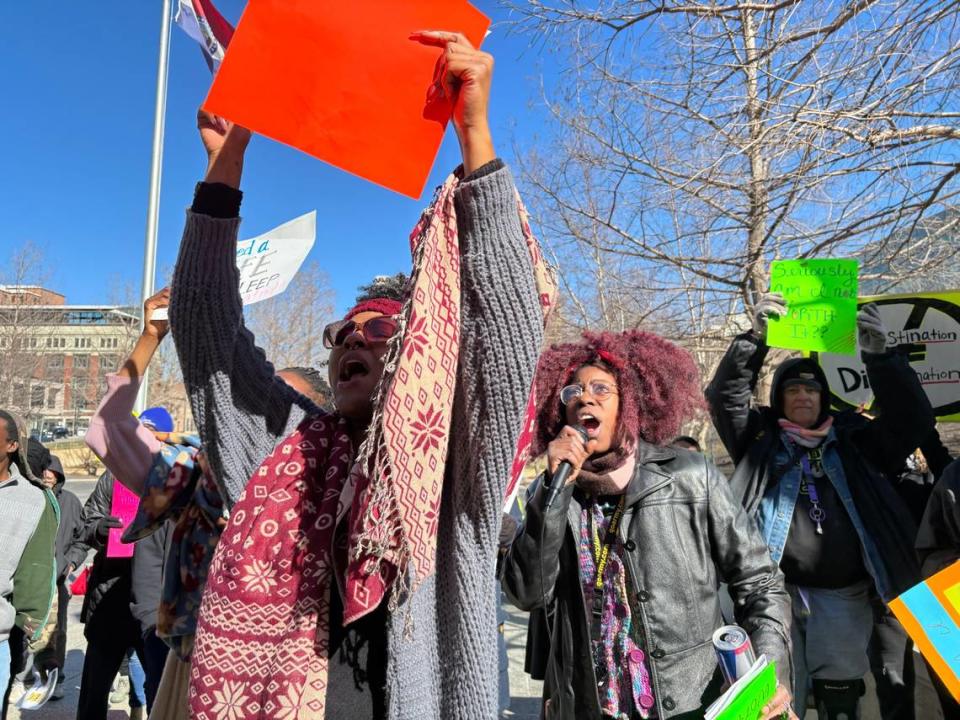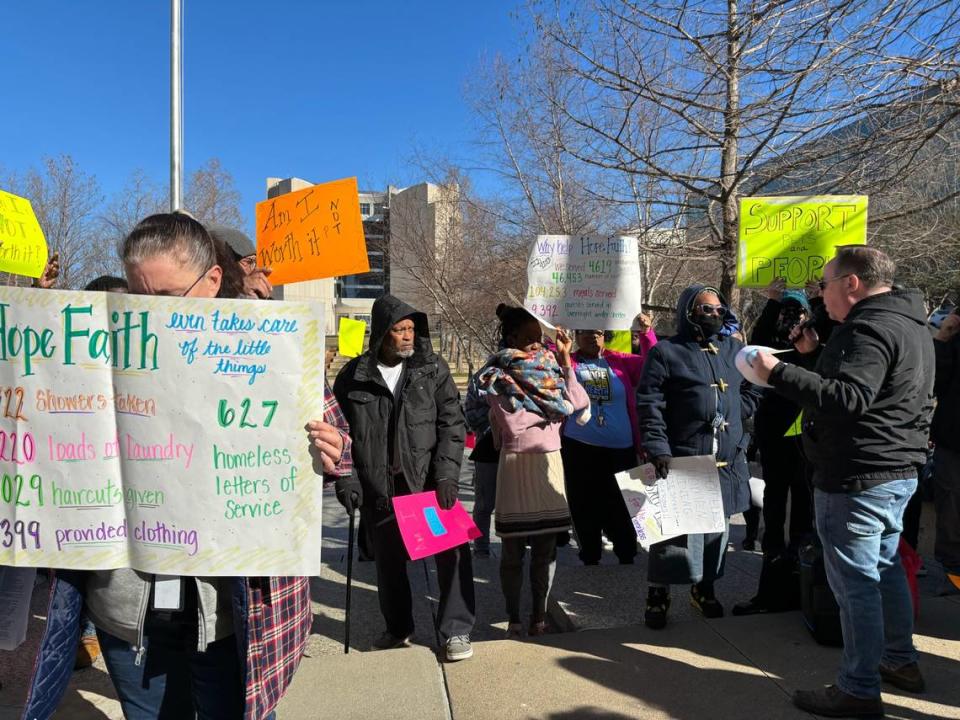Despite objections, KC Council votes to scrap plan for city’s first low barrier shelter
- Oops!Something went wrong.Please try again later.
Thursday, Kansas City’s City Council voted eight to two to scrap the current plan for the city’s first low barrier emergency shelter, considered a key initial step in the city’s five year initiative to address homelessness.
The situation has caused frustration among advocates for the unhoused community, who say the lack of such a shelter in a city the size of Kansas City is “unconscionable.”
Now, Hope Faith Ministries, the non-profit homeless assistance organization in Kansas City which had been awarded the contract, and other organizations have 30 days to submit new applications to be awarded the $7.1 million set aside by the American Rescue Plan Fund to build the shelter. The city has until the end of the year to allocate the funds from the federal government.
“We talk a lot about the things we’re going to do for the most vulnerable members of our communities,” said Councilman Jonathan Duncan before the vote. “This resolution flies in the face of that.”
Duncan and Councilman Nathan Willet were the only members of the council who voted against the resolution to scrap the plan.
Why a low barrier shelter?

The low barrier shelter is considered the first step in the city’s Zero KC initiative, a strategic effort first announced in September 2022, which aims to end the growing problem of homelessness in Kansas City. The plan was produced by the city’s Houseless Task Force, which Kansas City Mayor Quinton Lucas created in 2021 after members of the homeless community camped out for weeks on the lawn of City Hall.
But while the plan suggested new policies, it didn’t mandate them. Instead, any policy that arose in support of the plan required separate approval from the City Council.
In January, Hope Faith had their proposal for the low barrier shelter accepted, and Mayor Lucas introduced the ordinance. Their application was reportedly selected because theirs was the only plan that added low barrier shelter beds, meaning the beds are accessible to anyone, regardless of race, religion or addiction, or other circumstance.
“This is the first major piece of what (the city) wants and what we desperately need,” said Doug Langner, executive director at Hope Faith Ministries. “We don’t have a low barrier shelter period. And a city this size, that’s unconscionable.”
Now, with the decision to shelve the plan and start over, homeless advocates have been expressing frustrations and asking questions, particularly since the reasons for the change have not been made publicly clear.
“It is disheartening. If they’re listening to experts, I want to know who they are,” Langner said.

Councilman Crispin Rea told The Star that residents he’d spoken with in the Northeast neighborhoods where the shelter had been planned admitted that while they understood the need, they didn’t want to carry the load for the entire city.
“They had concerns about a complete concentration for the low barrier beds being exclusively located in their neighborhood,” Rea said.
Langner said they’d love to have multiple low barrier shelters, but added that they had to start somewhere. He thought it made the most sense to build it where unhoused people are already located.
Further, Langner said Hope Faith Ministries presented a sound plan initially, noting he researched what other cities across the country with high homelessness issues did to curb the problem, spoke with experts and followed all necessary steps in the proposal. Now, nearly two years into the five year initiative to reduce homelessness that has yet to take it’s first important step, he and other homeless advocates say there’s no good reason the city didn’t move forward with the plan already in place.
“The money is there. It’s free, it’s from the feds. It costs the city nothing. The only money we have spent is our time chasing our tails because they keep kicking this can down the road,” said one source with direct knowledge of the plan who asked not to be named.
Community weighs in

Mayor Lucas said during the finance, transportation and public safety hearing Wednesday — which voted to put the resolution up for a full council vote Thursday — that it’s his hope that the City Council can expedite the proposal period and get moving on, “entering into a contract with some efficiency.”
“I hope people will realize when we do come back, we’re very serious about taking the opportunity to move forward, even if some of those imperfections may still exist, even if we don’t necessarily see applications from some parts of the city perhaps,” Lucas said.
A handful of residents from throughout the metro spoke about the need for funds to be allocated throughout the city, not just in constructing one shelter. Several pointed to the reality of unhoused people being located outside of the area where the low barrier shelter would be built, as well as the need for multiple service providers to be involved.
Several councilmembers expressed concern about being able to meet the end of year deadline, but were assured by the mayor that the process would work quickly and efficiently.
Councilmember Duncan did not have a vote in the committee meeting Wednesday, but voiced his concerns nonetheless. A lot of community concerns would be alleviated with the 24-hour low barrier shelter, he said, including concerns about unhoused people having no place to go after current shelters like Hope Faith close each afternoon.
Spectators broke into applause when Duncan said, “We want to ensure that everyone has a place to stay in the city. This is not a third district issue. This is not a fourth district issue. This is not a first district issue. This is a city-wide issue.”
“The thing with people, is that if we don’t give them to a place to stay, they’ll find somewhere to stay. We see it time and time again,” he said. “When we remove a camp, the people move somewhere else. All we are trying to do is provide phase one for a project which hopefully has many, many, many more bases because less than a hundred beds is a drop in the bucket.”
Langner spoke to council and said he agreed with those who spoke from various neighborhoods about the need for multiple shelters throughout the city, but noted that just spreading out the money at the start isn’t a feasible plan. He pointed out that while $7.1 million sounds like a lot, the city spends $28 million to run an animal shelter. A shelter for people, he said, should offer its residents a similar amount of dignity.
Rev. Mindy Fugarino is with Independence Boulevard Christian Church based in a northeast neighborhood near Hope Faith, and said they alone feed 700 to 800 meals on Monday nights. Fugarino estimates around 200 of them are their neighbors experiencing homelessness.
“Those people that are in those beds have the opportunity to move on beyond that, and new people can come in behind them,” she said. “This is definitely something that’s needed citywide, but as Doug said, this is something that’s gonna take much more funding.”
What’s next?

Leaving the hearing this week, Langner addressed a group of people experiencing homelessness and fellow advocates, saying they will keep up the fight to get homeless people off the streets.
He said they now intend to keep their eyes and ears on public leaders, and ask the public to help keep their elected officials accountable as the bidding process begins anew for the city’s first low barrier shelter.
“It’s time, it’s past time for you who experience this today and tonight sleeping on the sidewalks of Kansas City. Enough is enough. We need to bring you inside. We need political will and courage,” Langner said. “...We’re gonna walk shoulder to shoulder and fight this until they pass it, because this is the vision.”
The resolution passed Thursday by the City Council directs the City Manager to cancel the current proposal and reissue one to be open for 30 days.

